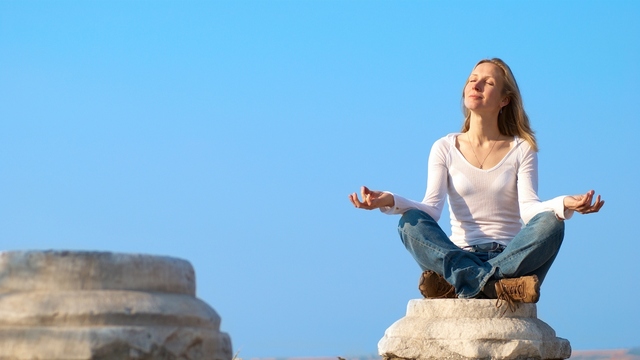 Pavlo Vakhrushev/PhotoSpin
Pavlo Vakhrushev/PhotoSpin
Meditation has done wonders for both mental and physical health. Research has been confirming this for some time.
Meditation can be described as a quiet time of thinking, reflection and relaxation of the mind and body.
In days gone by, meditation was warily considered to be something from the “east”. It was a foreign concept.
The 1960s made meditation a little more mainstream and in 2014, it’s not only done by everyone from stay-at-home parents to executives to athletes, it’s also recommended by the medical community.
There are many reasons why meditation can be so powerful. Let’s focus on five.
Stress Relief
Stress is a big factor, and indeed sometimes a cause, in illness. Stress is linked to high blood pressure, heart disease, cancer, mental illnesses and weak immune systems. While short term stress can actually bolster health and productivity, it’s long term stress that can negatively affect the mind and body.
Read an excellent report from the BBC about a study conducted by researchers at the University of Pittsburgh here.
The BBC article stated that the study found that while unhealthy behaviors are certainly a factor in ill-health, “... one of the key molecular players in these pathways is also among the most familiar of the body’s signalling chemicals: cortisol, a steroid commonly referred to as a “stress hormone”.
Cortisol is produced by the adrenal glands in response to stress.
The original view of cortisol was straightforward. Higher levels of stress prompt the adrenals to make more cortisol. The more cortisol you have in circulation, the harder it is on your health.
Meditation forces the body to calm down, to take time to reevaluate life and goals. It opens the mind and body up enabling you to relax and de-stress by employing quiet and calmness as you meditate.
Alone Time
Sure, there are people who always like company. But most people need alone time, even if they think they don’t.
Many people rush to work after a couple of hours of getting children breakfasted and off to school, a long commute and by the time they get to work, they are already filled with mental chatter.
Work is busy, then so is school pickup, the gym or just getting children home, working on endless school projects, making meals, cleaning up and listening to a lot of noise.
Our own mental chatter can be very negative, criticizing things we may have said and done, or not done. A lot of people joke that they’d have no friends if they really knew what was going on in their minds but it’s not always a joke.
Many people deal with a constant bombardment of people, traffic, noise, work and family.
Meditation ends all that. It’s quiet, alone time that can allow a person to be one with themselves. This way, a person can focus on their needs, or simply not think at all. Ending the mental chatter, for at least a little while, can bring great peace of mind.
Facing Addictions
A quiet mind, without input from others, can allow a person to be honest with themselves and face up to their personal behaviors, the study from the University of Pittsburgh reported.
Many of us eat too much, drink too much, smoke too much and exercise too little. Meditation is a mental exercise for us to take stock of how we live our lives.
One thing many addicts lack is self-awareness. Nor do they see (or perhaps care) that how they act can have terrible consequences on others.
Tommy Rosen, a Yoga teacher and addiction recovery expert, wrote an article for the Huffington Post espousing meditation for recovering addicts.
He said, “Of course, one can stay sober without yoga and meditation. It's just that if you want to lift yourself up out of the energy of addiction and break through to a new level of strength and awareness, one will have to adopt a practice that continues the detoxification process on a much deeper level.”
Addicts are not just addicted to their substance of choice. They are escape artists, doing whatever they can to escape from their past, their pain and their inability to cope.
Meditation teaches this ability and serves to help find perspective, awareness and personal responsibility.
Breathing and Self-Calming Techniques
Before reaching for a bottle of pills for anxiety, consider meditation first. Meditation, like yoga, teaches proper breathing techniques and self-calming. When we feel stressed, our breathing is short and quick and we experience rapid heartbeat.
The very nature of meditation is calmness, quiet, and removing the outside world from our space. The deeper the meditation, the deeper the relaxation.
And while people should certainly take medications that are needed for good health, those suffering from anxiety should consider meditation an intricate part of their all-round health focus.
Physical Fitness
Not all meditation is sitting quietly. Yoga infuses meditation into its techniques and is a great combination for both physical and mental health.
Yoga uses the body’s own weight to stretch and strengthen the body, allowing for a much stronger and toned physique.
Yoga can reshape the body so that clothes fit better. Muscles are stronger and leaner.
Yoga poses help with back and neck pain. And the best thing about it is that it is done at the pace of each person, not the class as a whole.
Relaxation and breathing techniques are part and parcel of yoga and there is generally a quiet, reflective start and end to the class. You can read my article It’s National Yoga Month! Which Style Will Work for You? here on the different kinds of yoga available and their benefits.
A wonderful thing about meditation is that you can’t overdo it, you can’t get hurt by it and there are no side effects!
Think of meditation as an important part of your health and wellness campaign that every person should have for themselves. Your body and mind will love you for it.
Sources:
BBC.com. “Stress and illness: The decades-long search for a link,” by Geoff Watts. Web. Retrieved Nov 28th, 2014.
http://www.bbc.com/future/story/20120619-how-stress-could-cause-illness
The Huffington Post. “Recovery 2.0: Yoga and Meditation for People in Recovery From Addiction,” by Tommy Rosen. Web. Retrieved Nov 28th, 2014.
http://www.huffingtonpost.com/tommy-rosen/yoga-for-addiction_b_3523111.html
Reviewed December 1, 2014
by Michele Blacksberg RN
Edited by Jody Smith




Add a CommentComments
There are no comments yet. Be the first one and get the conversation started!